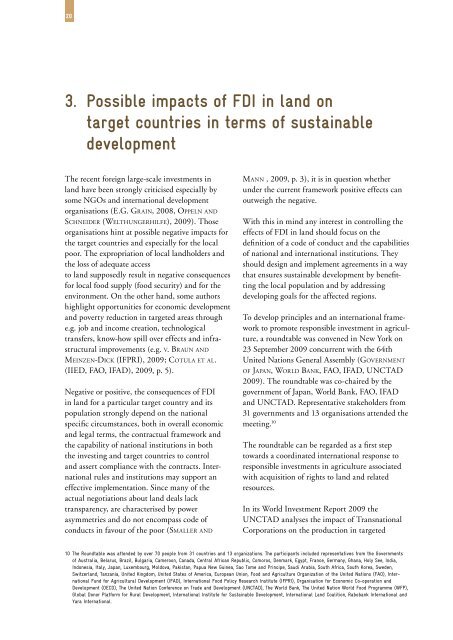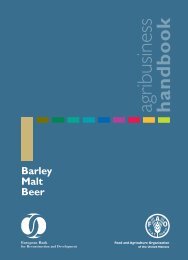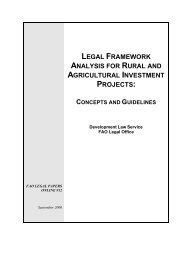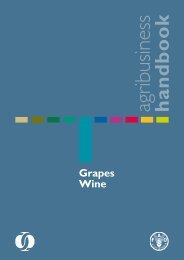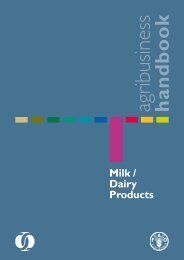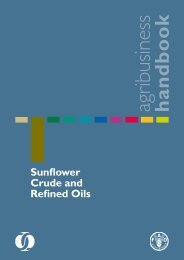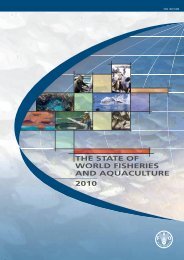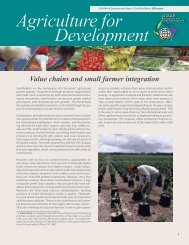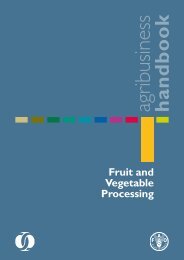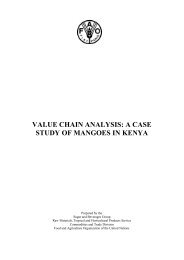Foreign Direct Investment (FDI) in Land in developing countries
Foreign Direct Investment (FDI) in Land in developing countries
Foreign Direct Investment (FDI) in Land in developing countries
- No tags were found...
Create successful ePaper yourself
Turn your PDF publications into a flip-book with our unique Google optimized e-Paper software.
203. Possible impacts of <strong>FDI</strong> <strong>in</strong> land ontarget <strong>countries</strong> <strong>in</strong> terms of susta<strong>in</strong>abledevelopmentThe recent foreign large-scale <strong>in</strong>vestments <strong>in</strong>land have been strongly criticised especially bysome NGOs and <strong>in</strong>ternational developmentorganisations (E.G. Gra<strong>in</strong>, 2008, Oppeln andSchneider (Welthungerhilfe), 2009). Thoseorganisations h<strong>in</strong>t at possible negative impacts forthe target <strong>countries</strong> and especially for the localpoor. The expropriation of local landholders andthe loss of adequate accessto land supposedly result <strong>in</strong> negative consequencesfor local food supply (food security) and for theenvironment. On the other hand, some authorshighlight opportunities for economic developmentand poverty reduction <strong>in</strong> targeted areas throughe.g. job and <strong>in</strong>come creation, technologicaltransfers, know-how spill over effects and <strong>in</strong>frastructuralimprovements (e.g. v. Braun andMe<strong>in</strong>zen-Dick (IFPRI), 2009; Cotula et al.(IIED, FAO, IFAD), 2009, p. 5).Negative or positive, the consequences of <strong>FDI</strong><strong>in</strong> land for a particular target country and itspopulation strongly depend on the nationalspecific circumstances, both <strong>in</strong> overall economicand legal terms, the contractual framework andthe capability of national <strong>in</strong>stitutions <strong>in</strong> boththe <strong>in</strong>vest<strong>in</strong>g and target <strong>countries</strong> to controland assert compliance with the contracts. Internationalrules and <strong>in</strong>stitutions may support aneffective implementation. S<strong>in</strong>ce many of theactual negotiations about land deals lacktransparency, are characterised by powerasymmetries and do not encompass code ofconducts <strong>in</strong> favour of the poor (Smaller andMann , 2009, p. 3), it is <strong>in</strong> question whetherunder the current framework positive effects canoutweigh the negative.With this <strong>in</strong> m<strong>in</strong>d any <strong>in</strong>terest <strong>in</strong> controll<strong>in</strong>g theeffects of <strong>FDI</strong> <strong>in</strong> land should focus on thedef<strong>in</strong>ition of a code of conduct and the capabilitiesof national and <strong>in</strong>ternational <strong>in</strong>stitutions. Theyshould design and implement agreements <strong>in</strong> a waythat ensures susta<strong>in</strong>able development by benefitt<strong>in</strong>gthe local population and by address<strong>in</strong>gdevelop<strong>in</strong>g goals for the affected regions.To develop pr<strong>in</strong>ciples and an <strong>in</strong>ternational frameworkto promote responsible <strong>in</strong>vestment <strong>in</strong> agriculture,a roundtable was convened <strong>in</strong> New York on23 September 2009 concurrent with the 64thUnited Nations General Assembly (Governmentof Japan, World Bank, FAO, IFAD, UNCTAD2009). The roundtable was co-chaired by thegovernment of Japan, World Bank, FAO, IFADand UNCTAD. Representative stakeholders from31 governments and 13 organisations attended themeet<strong>in</strong>g. 10The roundtable can be regarded as a first steptowards a coord<strong>in</strong>ated <strong>in</strong>ternational response toresponsible <strong>in</strong>vestments <strong>in</strong> agriculture associatedwith acquisition of rights to land and relatedresources.In its World <strong>Investment</strong> Report 2009 theUNCTAD analyses the impact of TransnationalCorporations on the production <strong>in</strong> targeted10 The Roundtable was attended by over 70 people from 31 <strong>countries</strong> and 13 organizations. The participants <strong>in</strong>cluded representatives from the Governmentsof Australia, Belarus, Brazil, Bulgaria, Cameroon, Canada, Central African Republic, Comoros, Denmark, Egypt, France, Germany, Ghana, Holy See, India,Indonesia, Italy, Japan, Luxembourg, Moldova, Pakistan, Papua New Gu<strong>in</strong>ea, Sao Tome and Pr<strong>in</strong>cipe, Saudi Arabia, South Africa, South Korea, Sweden,Switzerland, Tanzania, United K<strong>in</strong>gdom, United States of America, European Union, Food and Agriculture Organization of the United Nations (FAO), InternationalFund for Agricultural Development (IFAD), International Food Policy Research Institute (IFPRI), Organisation for Economic Co-operation andDevelopment (OECD), The United Nation Conference on Trade and Development (UNCTAD), The World Bank, The United Nation World Food Programme (WFP),Global Donor Platform for Rural Development, International Institute for Susta<strong>in</strong>able Development, International <strong>Land</strong> Coalition, Rabobank International andYara International.


